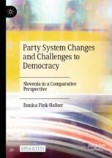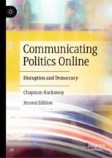Search
Search Results
-
Exposure to Extremely Partisan News from the Other Political Side Shows Scarce Boomerang Effects
A narrow information diet may be partly to blame for the growing political divides in the United States, suggesting exposure to dissimilar views as a...

-
Conclusion: Politics and the Political Informed by Fandom
In this chapter, I will conclude the book by examining the implications of investigating the manifestation of polarization in online political...
-
Are We Living in a Post-scandal Era? High-Choice Media Environments, Political Polarization, and Their Consequences for Political Scandals
Previous research reveals that political scandals often have negative consequences for political candidates and may even result in resignation....
-
The Prevalence of Bipartisanship in U.S. Foreign Policy: An Analysis of Important Congressional Votes
To what extent are U.S. elected officials polarized on foreign policy? And how do patterns of polarization and bipartisanship differ across policy...
-
Party System Characteristics and Challenges to Democracy
In the literature, several theses can be found on the relationship between the characteristics of party systems and democracy. Particular attention...
-
Constitutional Crisis, Norm Derogation, and the Broader Impact of Partisan Polarization in Contemporary American Politics
Michael T. Oswald and John D. Robertson introduce the broader impact of partisan polarization in contemporary American politics and lay the...
-
Spatial Polarization, Partisan Climate, and Participatory Actions: Do Congenial Contexts Lead to Mobilization, Resignation, Activation, or Complacency?
With increasing evidence on deepening cleavages along geographic lines, we argue that the local political climate plays an important role in...

-
Partisanship and Support for Israel in the USA
This chapter describes and analyzes the development of Republican and Democrat attitudes in the USA toward Israel and the Arab/Palestinian-Israeli...
-
Partisan Stability During Turbulent Times: Evidence from Three American Panel Surveys
The past decade has witnessed profound changes in the tenor of American party politics. These changes, in tandem with growing affective polarization...

-
The Affects of Change: An Ethnography of the Affective Experiences of the 2013 Military Intervention in Egypt
In this chapter the author discusses the difficulties of exploring the ethnography of events as they are happening, especially when they are violent,...
-
Moral Rhetoric, Extreme Positions, and Perceptions of Candidate Sincerity
Most Americans believe that politicians do not try to keep their campaign promises. This deep level of cynicism threatens to break a fundamental link...

-
Party Animals? Extreme Partisan Polarization and Dehumanization
The affective, identity based, and often negative nature of partisan polarization in the United States has been a subject of much scholarly...

-
The Affective Atmosphere of Ankara-Tehran Alignment in Cold War (1946–1979)
This chapter explores the affective atmosphere of pro-Western alignment between Ankara and Tehran under the global Cold War rules. The first part...
-
Loving to Hate: Fandom Fuelling Polarized Behaviour
Drawing on interviews (n = 22) with Australian online political commenters and representative survey results from online commenters in Australia and...
-
Negative Partisanship
Digital mobile technology creates a variety of impacts on the end user and democracy generally. The use of ideological news and social media is...
-
Social Media in the 2021 Election Campaign
Since the use of social media in election campaigns was made legal in 2013, platforms such as Twitter and Facebook have been widely adopted by...
-
Using Exit Polls to Teach Students and Sustain a Scholarly Agenda
Political scientists face challenges sustaining a research agenda—especially one dependent on original data that are expensive and time-consuming to...
-
Conclusion
Drawing on issues and insights emerging from individual chapters, this concluding chapter addresses some of the broader themes about the state of...
-
Partisan Identity, Counter-Attitudinal Information, and Selective Criticism in India
How do people react to information that challenges their party’s policies? While most of the existing literature focuses on possible changes in issue...

-
Expanding Agonistic Engagement
The main question of this chapter is whether agonistic political activity could take a less direct and confrontational mode. This is a response to...
